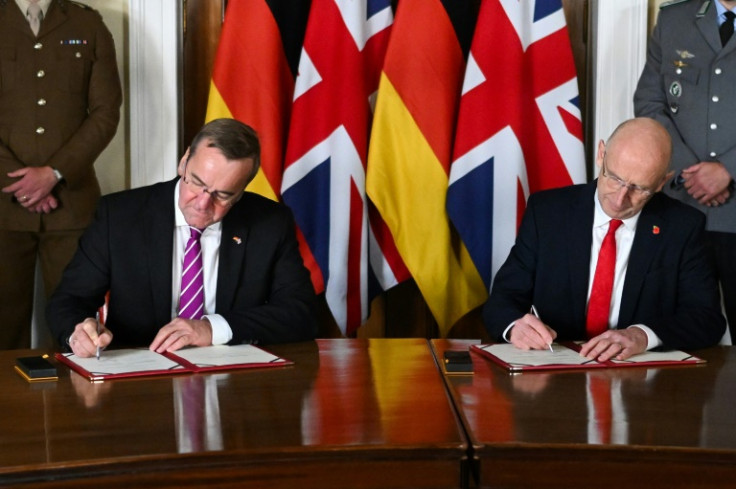
London and Berlin on Wednesday hailed a "milestone" in military cooperation, as they signed a new defence pact that would see German submarine-hunting planes operate from British bases and counter threats from Russia after its full-scale invasion of Ukraine.
Europe's two biggest defence spenders said the Trinity House Agreement, signed by defence ministers John Healey and Boris Pistorius, would strengthen NATO's "European pillar" at a time of increased threat from the east.
An eye-catching part of the deal is the prospect of German Boeing P-8 aircraft patrolling the skies of the North Atlantic from a base in northern Scotland.
Another will see German arms giant Rheinmetall open a UK factory making artillery gun barrels, using British steel.
Healey told a joint news conference that European allies needed to take on more responsibility for European security "and this is the driving force behind our NATO-first UK defence strategy.
"We share the same threats: war in Ukraine, conflict in the Middle East, growing Russian aggression. We share the same values: democracy, individual freedom, rule of law," he said.
Pistorius added that it was "our responsibility in Europe to strengthen the European angle, the European pillar of NATO.
"The US will shift their focus more to the Indo Pacific... so it is only a matter a question of, 'will they do much less in Europe because of that, or only a little bit less?'.
"But anyway, we would have to do more, and this is our task."
The agreement is the first between the UK and Germany and aims to put previously ad hoc cooperation between the two countries on a more regular footing.
The artillery factory would support more than 400 jobs, while the two countries will undertake joint work to develop deep strike weapons that can travel further with more precision than current systems, including Storm Shadow cruise missiles.
The two armies will train together more often in a bid to strengthen NATO's eastern flank, with fears for security in Baltic states and Scandinavia because of Russia's actions against Ukraine.
"The Trinity House Agreement is a milestone moment in our relationship with Germany," Healey said.
The deal "will be the first pillar" of a "new and wider friendship treaty for us," he added.
Pistorius said the deal was evidence that "the UK and Germany are moving closer together," following 14 years of Conservative rule that saw the UK exit the European Union.
"We must not take security in Europe for granted," he warned.
"Russia is waging war against Ukraine, it is increasing its weapons production immensely and has repeatedly launched hybrid attacks on our partners in Eastern Europe.
"With the Trinity House Agreement, we are showing that the NATO Allies have recognised what these times require," he added.
But former UK defence minister Ben Wallace said on X that if the deal "is to mean anything then Germany would have agreed with UK requests to send Taurus to Ukraine... otherwise it is pretty hollow and made up of stuff we are already doing or had started."
Germany is currently refusing to supply Ukraine with Taurus missiles with a range of over 500 kilometres (310 miles) over fears that they could hit Russian territory.







